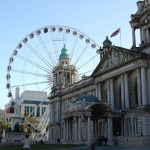Belfast – the Capital of Northern Ireland
Belfast (from Irish: Béal Feirste meaning “mouth of the sandbars”) is the capital of and the largest city in Northern Ireland. It is the seat of devolved government and legislative Northern Ireland Assembly. The Belfast metropolitan area has a total population of 579,276. (2001).
Historically, Belfast has been a centre for the Irish linen industry, tobacco production, rope-making and shipbuilding: the city’s main shipbuilders, Harland and Wolff, which built the ill-fated RMS Titanic, propelled Belfast on to the global stage in the early 20th century as the largest and most productive shipyard in the world. On April 14, 1912 Titanic hit an iceberg and sank after 2 hours and 40 minutes. 1316 passengers and 892 crew members were on board, totally 2208 people. 704 of them survived and over 1500 died. Titanic’s catastrophe became legendary and one of the biggest in the history of shipwreck. Several movies’ stories are based on this event.
The site of Belfast has been occupied since the Bronze Age. The Giant’s Ring, a 5,000-year-old henge, is located near the city, and the remains of Iron Age hill forts can still be seen in the surrounding hills. Belfast remained a small settlement of little importance during the Middle Ages. John de Courcy built a castle on what is now Castle Street in the city centre in the 12th century, but this was on a lesser scale and not as strategically important as Carrickfergus Castle to the north, which was built by de Courcy in 1177. The O’Neill clan had a presence in the area. In the 14th century, Clan Aedh Buidh, descendants of Hugh O’Neill built Grey Castle at Castlereagh, now in the east of the city. Conn O’Neill also owned land in the area, one remaining link being the Conn’s Water river flowing through east Belfast.
Belfast became a substantial settlement in the 17th century after being established as a town by Sir Arthur Chichester, which was initially settled by Protestant English and Scottish migrants at the time of the Plantation of Ulster. (Belfast and County Antrim, however, did not form part of this particular Plantation scheme as they were privately colonised.) In 1791, the Society of United Irishmen was founded in Belfast, after Henry Joy McCracken and other prominent Presbyterians from the city invited Theobald Wolfe Tone and Thomas Russell. to a meeting, after having read Tone’s “Argument on Behalf of the Catholics of Ireland”. Evidence of this period of Belfast’s growth can still be seen in the oldest areas of the city, known as the Entries.
Belfast blossomed as a commercial and industrial centre in the 18th and 19th centuries and became Ireland’s pre-eminent industrial city. Industries thrived, including linen, rope-making, tobacco, heavy engineering and shipbuilding, and at the end of the nineteenth century, Belfast briefly overtook Dublin as the largest city in Ireland. The Harland and Wolff shipyards became one of the largest shipbuilders in the world, employing up to 35,000 workers.
In 1920-22, Belfast became the capital of the new entity of Northern Ireland as the island of Ireland was partitioned. The accompanying conflict (the Irish War of Independence) cost up to 500 lives in Belfast, the bloodiest sectarian strife in the city until the “Troubles” of the late 1960s onwards.
Belfast was heavily bombed during World War II. In one raid, in 1941, German bombers killed around one thousand people and left tens of thousands homeless. Outside of London, this was the greatest loss of life in a night raid during the Blitz.
Belfast has been the capital of Northern Ireland since its establishment in 1921 following the Government of Ireland Act 1920. Since its emergence as a major city, it had been the scene of various episodes of sectarian conflict between its Roman Catholic and Protestant populations. It officially ended in 1998 with the signing of Belfast Treaty.
Now Belfast is a fast growing city that attracts more and more tourists.
Pages: 1 2

